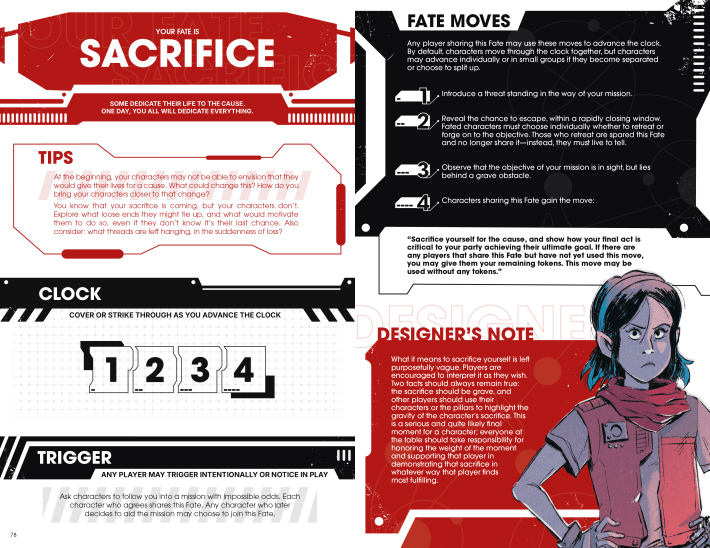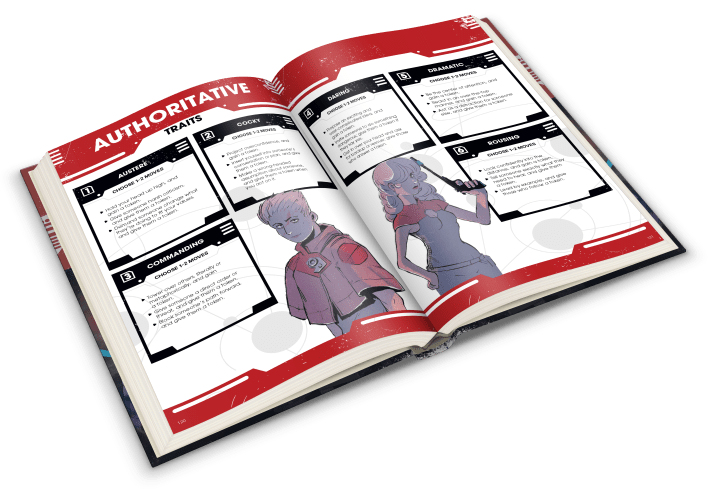Weeks ago, I found myself playing revolutionary over Discord. I was playing Choli, a Charli XCX-esque spy running a nightclub wrapped in layers of gregariousness so that no one would suspect her. What I would be roleplaying that night was the final night of her life.
I was playing Going Rogue, a companion for the tabletop roleplaying game Galactic, which is inspired by the Star Wars universe. I had been invited to play by the game’s designer, Jess Levine, who had previously asked me to write a piece of fiction as a setting supplement for the game’s physical edition, which is being Kickstarted right now. Going Rogue intrigued me specifically because it was inspired by Rogue One and Andor—in particular, Going Rogue has a mechanic baked into the game where your character is more or less guaranteed to go out in a blaze of glory for the cause.
“Going Rogue is a game where your characters are fated to die at the end,” Jess told me over a Discord call. “That was one of the things that I wanted from the very beginning, because I was having those feelings, like, was any of this work that we did worth it?”
Jess first started developing this game during the first Trump administration and the protests for George Floyd. In her experience as a political organizer, she often felt the absence of the kind of catharsis you might get while watching a movie like Rogue One. In a fictional setting, you can know for sure that a character’s sacrifice has been worth it. In real life, you never really know if you’re planting the seeds of trees whose shade you’ll never sit in, or just digging yourself a big hole.

“With Going Rogue, I was having the emotional struggle of like, was this worth it? And so what I wanted in the design of the game was that I could feel the catharsis, the bleed,” she said.
She explained that “bleed” is a tabletop gaming term for when “you experienc[e] the emotions of your characters, and it bleed[s] out into real life. I wanted to design the game in a way that, as your character realized that they were willing to voluntarily sacrifice their life for this, you were narratively guaranteed by the mechanics that that sacrifice was worth it. You get to see, after they die, how it transforms the galaxy. I wanted you to get that feeling because you don't get that certainty in real life.”
Levine says that she knows that there are limits to the kind of change one can effect by designing a left wing tabletop roleplaying game. She didn’t make this game to convince anyone to become a socialist, but instead to create an emotional tool that serves as a mirror for the players’ own feelings about what it means to devote your life to a political cause.
“Going Rogue asks you to design your character, design your world, what you see in it, what you want and what you are struggling with in participation in the struggle, and you feel feelings that you are feeling outside of Going Rogue,” Levine said. “For people who aren't already organizers, it's a fun game, a game that lets them play in some cool themes.”
Like Levine, I am a huge fan of Star Wars. As every Star Wars fan knows, being a Star Wars fan means you hate Star Wars as much as you love it. Going Rogue was also a way for Levine to work out her issues with the series that inspired these games.
“You can reskin Going Rogue to be all the original stuff [from Star Wars]. I prefer, at this point, to play it not in canon Star Wars,” Levine said. “And also, there are things I hate about canon Star Wars. I think it sucks that the Jedi are child kidnapping, sexless acetics!”
In particular Going Rogue is a remix of Rogue One, which depicts the lives of a group of rebel agents who give their lives for the rebellion before the original trilogy.
“I love Rogue One and I hate Rogue One,” Levine said. “I was just watching that movie and like, watching that conflict happen in these meetings Mon Mothma and everyone else, and I was like, ‘This is what I'm going through in the organizing spaces I'm in right now.’ And that's super compelling.”
Going Rogue aims to do more than just allow players to 'fix' Star Wars’s narrative problems.
In playing Going Rogue, you assemble a group of characters who don’t all agree with each other, or maybe have nothing in common with each other than their commitment to the rebellion against a fascist dictatorship. When I was developing Choli in the playsession that Levine invited me to, I was thinking about how to create a character who would deliberately push people’s boundaries and invite friction into conversations. This galactic party girl was someone who was brutal and ruthless, hiding her ability to manipulate and coax information out of people behind charm and opulence. I envisioned her as someone who feels self righteous about how much she has given to the cause, inviting the ire of people who put themselves in physical danger.
This is basically the kind of character that I wish was in a Star Wars story, but doesn’t ever appear. For Levine, Going Rogue was partially an exercise in fixing the things about Rogue One and Star Wars in general that bother her—especially Rogue One’s lead character, Jyn Erso.
“Jyn is a terrible character,” Levine said. “This is, from what I can tell, because of a series of rewrites. In the original version of Rogue One, she is a rebel from the beginning and is very committed. And when Gilroy came in, he wrote this character who is more ‘I'm cynical and jaded, and they're forcing me to be here,’ but you end up with a mishmash.”
Levine said that one of the playbooks for Going Rogue is based on the Gilroy version of the character: the Leveraged.
“Leverage is defined by the fact that someone is forcing them to be here,” she said. “They are being leveraged, but they have something in their heart, and you get to choose during character creation, what it is that challenges even their cynicism.”
It doesn’t escape Levine’s notice that this is, essentially, the story of Cassian Andor, lead character of the acclaimed Disney+ series Andor, which has just finished its second and final season. Levine said that she thinks that the Andor show made good on the promise of Jyn Erso’s arc, showing how someone can go from being blackmailed into a cause to being so committed that he ends up giving his life for it.

But Going Rogue aims to do more than just allow players to “fix” Star Wars’s narrative problems. It also allows players to explore this narrative of rebellion without having to interface with an evil entertainment empire: Disney.
“I put this whole crowdfunder together in five months because Disney announced that Andor season two was premiering April 22 and [Galactic creator Riley Rethal] and I had always been like, it would probably be good for us, from a business perspective, to release the physical edition around Andor,” Levine said. “So I start putting it together in late December, early January, and then Riley messages me and goes, ‘Did you see that Disney+ is now on the BDS list?’”
Currently, Disney+ is a priority target on the BDS boycott list, which asks supporters of the rights of Palestinians to economically and culturally divest from Israel. Disney+ is a priority target because of Marvel’s Captain America: Brave New World and Disney’s Snow White.
“[These movies] star actors Shira Haas and Gal Gadot, respectively, that have consciously and irrefutably taken up roles as cultural ambassadors for Israel, directly representing genocidal Israel’s propaganda efforts,” the statement on the BDS website reads. “For Captain America, Marvel and Disney are reviving the racist character of Ruth Bat-Seraph, whose decades-old backstory includes working for Mossad. Disney+ is therefore clearly implicated in enabling Israel’s genocide by dehumanizing Palestinians.”
Jess Levine and Riley Rethal have both already participated in a boycott meant to pressure a tabletop roleplaying game convention into making a statement against Zionism, and wanted to figure out a way to make this game compliant with the ongoing BDS boycott. Eventually they settled on including a statement about the BDS boycott that encourages people to cancel their Disney+ subscriptions every time they mentioned the Disney-owned Star Wars property. They both found that including that statement led to people leaving comments about canceling their Disney+ subscriptions in solidarity with the BDS boycott.
Going Rogue is an opportunity for Star Wars fans to make the story of Star Wars their own, including making it more in league with their own politics by taking Disney out of it.
“Something I like about tabletop role playing and adaptational tabletop role playing is it says, ‘Actually, fuck them. They don't get to own this thing,’” Levine said. “We can't fully divest from the connection to Star Wars. Obviously, we are downstream of it in certain ways. But we are also trying to say, fuck [Disney’s] ownership of this thing that you love.”


